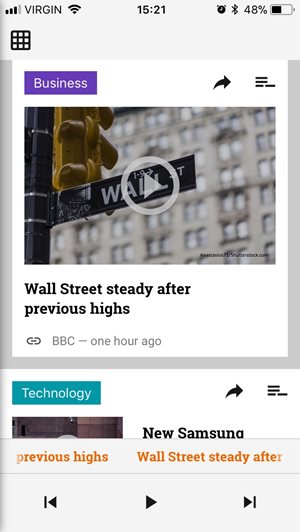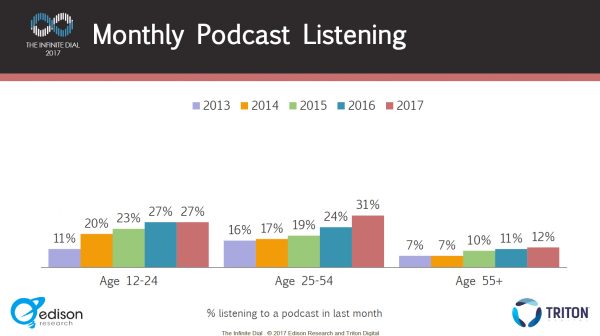Spokata Delivers Real-Time News via Text-to-Speech Technology
Do you want to catch up on the news to know what’s going on outside your own bubble? But,  you do not have enough time to scroll endlessly through a newsfeed, are exhausted of staring at a screen or simply, your mobile screen is too small for your viewing preferences? You wish there was an easier way to keep up with current events that you are interested in on the go without taking time out of your busy day? Then, let me introduce you to a new app called Spokata that streams real-time audio content from over 100 verified digital news sources like BBC, Bloomberg, and The Guardian using a combination of its proprietary algorithms and Polly, an Amazon AI text-to-speech service.
you do not have enough time to scroll endlessly through a newsfeed, are exhausted of staring at a screen or simply, your mobile screen is too small for your viewing preferences? You wish there was an easier way to keep up with current events that you are interested in on the go without taking time out of your busy day? Then, let me introduce you to a new app called Spokata that streams real-time audio content from over 100 verified digital news sources like BBC, Bloomberg, and The Guardian using a combination of its proprietary algorithms and Polly, an Amazon AI text-to-speech service.
“Video and text require your undivided attention. Spokata’s short format is explicitly designed for people on the go. Our target audience is typically doing something else while listening -- driving, working out, or in line at the grocery store,” explains Zack Sherman, CEO and founder of Spokata. He is on point as more than 67 million people in the U.S. listen to podcasts each month, according to a recent report from Activate. When asked to name all the locations where they listen to podcasts, the most popular places are the car, bedroom, living room, gym, and while at work. Key features of the Spokata iOS app and website include:
-
Dynamic content network - The network transforms breaking news from over 100 verified digital news sources.
-
Daily Briefing - The top stories from around the world are automatically compiled into a short briefing delivered every morning.
-
Custom playlists - About to hit the gym or head to work? Cue up stories from across Spokata’s channels to create your own personal radio station.
-
Social media friendly - Users can make sure their friends are on top of the news, and know what they care about, by sharing audio through integrations with Facebook and Twitter.
Interview with the Founder of Spokata Zack Sherman
To understand the drive behind building Spokata, I reached out to Zack Sherman, CEO and founder of Spokata. Here's the story of how this journey began:
founder of Spokata. Here's the story of how this journey began:
Can you tell us about the problem you are trying to solve with Spokata?
Sherman: I feel more urgency than ever to stay on top of current events. But I also feel frustrated by the amount of reading this requires on a day-to-day basis.
As I searched for a personal solution, I found myself gravitating toward streaming audio products. But I found that most of them were not much better than old school radio. So, I started to feel that there was something missing in the landscape which matched the unique properties of audio, with the delivery of high-quality news and information. The rise of podcasting shows that on-demand audio (content other than music) has broken into the mainstream. Audio fits within the context of mobility in ways that video and text cannot.
We think about users who are in the checkout line at the grocery store, commuting, or working out. Those are tough places to watch a video, read an article or listen to 40-minute podcasts. But they are all great places to listen to short, real-time, audio content.
We set out to build a new kind of audio product which does a lot of things podcasts can’t do. They’re not real time. They’re long. And they can’t always provide you with content you want when you want it. But the market for the Spokata is potentially much larger and global. The WSJ wrote a great piece that captures our feeling about this trend -- namely that the next billion internet users are engaging with technology in a totally different manner. We’re preparing for this near future where typing and text are almost entirely replaced by media.
What’s unique about what you are building and why do you think people should use Spokata?
Sherman: Spokata delivers the best real-time news and information from over 100 verified global news sources.
Within seconds, our technology summarizes text and transforms it into short streaming audio via Polly, an AI text-to-speech (TTS) service developed by Amazon. From a technological perspective, we feel confident that this specific implementation has never been done before. But more importantly, from a user perspective, we believe we can deliver the easiest and fastest way to stay up to date on real-time breaking, world, politics, entertainment, technology, and business news from dozens of verified US and international sources.
Our content delivers just the facts, but we make it easy to access the full article behind the audio summary. We hope this will encourage people to discover the many incredible publications which might not necessarily show up in their social feeds or search results.
What was the biggest challenge(s) while building the product early on and how did you solve it?
Sherman: Building our summarization algorithm was a huge challenge -- and one that we are not done solving. In order to automatically create short bursts of information from dozens of text sources, which vary in both length and format, you have to try many different approaches. Before we launched the product we ran that process upwards of 50 million times to get to where we are now. And there is still a lot of room left for improvement.
My Experience with Spokata
If you are a podcast listener, one of the first things to stand out for you will be having news delivered by a non-human voice, Polly, which is an Amazon AI text-to-speech service. It is not necessarily a drawback as the premise of the platform is providing people with brief factual summaries of real-time news so they could be more productive in their busy lives. To be honest, when I first heard Polly’s voice, I felt like my GPS was reading the news to me but it didn’t take me long to get used to it. In fact, now, I like how clearly it speaks.
The app has a very easy user interface and self-explanatory navigation built in. After you sign  up, it asks you to choose channels that you are interested in, including Top Stories, World, Business, Technology, Entertainment, and Politics. From there, you can either go by channel, play all the news that fall under a specific category or you can compile your own mix list packed with individual news from various channels by simply touching on “add to the playlist” icon for each. Before I left home to work, I made my playlist and then, listened to them on the go. If you don’t have time to compile the news before you leave home but still want to catch up with what’s in the news on the go, Spokata offers another option called “Daily Briefing” where you can listen to all of the latest stories without making any extra effort.
up, it asks you to choose channels that you are interested in, including Top Stories, World, Business, Technology, Entertainment, and Politics. From there, you can either go by channel, play all the news that fall under a specific category or you can compile your own mix list packed with individual news from various channels by simply touching on “add to the playlist” icon for each. Before I left home to work, I made my playlist and then, listened to them on the go. If you don’t have time to compile the news before you leave home but still want to catch up with what’s in the news on the go, Spokata offers another option called “Daily Briefing” where you can listen to all of the latest stories without making any extra effort.
It is important to note that the platform doesn’t read you the whole news article, in fact, it condenses the article to somewhere between 80 and 90 percent. Therefore, I wondered if I could read the actual article when I find the summary enticing, and yes, apparently, you can! Each story has been displayed with a teaser image, its original headline, the name of the publication, and when the article was published as well as a “link” icon that takes you to the original full article on the publication’s site. I found this set up super useful as you can go in depth if you want to hear more on the news you have listened to on Spokata.
As far as design goes, I like how they have thumbnail images for each news items, even though you don’t get visual content when you tap the play button watermark displayed on the image. Fetching images from various sources may create an over-cluttered look sometimes but Spokata seems to nail a clean look while satisfying the appetite for visual content. If it was just listed with the headlines like podcasts, it wouldn’t have been as impactful.
My Wishlist to Spokata
It would be cool if users could pick some areas based on their interests as a starting point, and from there the platform could learn based on what users tune into. BBC News app, for instance, has channels just like Spokata has, but additionally, it enables its readers to create their own channel called “My News” where they are provided a list of different keywords under each category they can choose from.
Another drawback I discovered was that the playlist you have created disappears when you swipe up in the app. In my opinion, it seems to jeopardize an extremely user-friendly interface. I would prefer to have the unopened items on my list saved for the following 24 hours, at least.
Lastly, I have a humble suggestion on the length of Spokata’s summary. I know that the premise of the app is condensing the original article by somewhere between 80 and 90 percent but still I feel, if it gave a little bit longer glimpse into the topic, people would have a better understanding of the news to decide whether to go in deeper or to move on to the next.
Are Podcasts Still Relevant?
If you asked me this, my answer would be somewhere on the ‘Yes’ side of the scale. However, if you asked this to 112 million Americans, the answer would be “definitely”, according to the latest Edison Research report, and the market research firm also confirms that the figure is up 11 percent from 2016, with 67 million listening to podcasts at least monthly. However, it doesn’t mean that 112 million Americans are listening to podcasts monthly or weekly. In fact, when we look at the figures representing the group of regular podcast listeners, the landscape changes drastically because the monthly podcast listening growth between 2017 and 2016 is only 3 percentage points. Therein lies the opportunity as it means there is still plenty of room for podcast audiences to grow.
To me, this disparity also means a cry for innovation. When you think about it, 40 percent of Americans (112 million) report having ever tried listening to a podcast, but only 24 percent of Americans report getting hooked on the concept and becoming monthly podcast listeners. The general idea is tempting to try out but the experience itself is not meaningful enough for listeners to stick around. Call me an opportunist but this area seems to have the perfect potential to be disrupted.
If you feel you have started falling in love with the idea of podcasting, let me get you all nirvana on the idea then because the juicy part is that two-thirds of podcast listeners engage in purchase-related behaviors after hearing podcast ads, Activate says. Additionally, research from the Interactive Advertising Bureau (IAB) and Edison Research unveiled that 95% of listeners will take action after listening to a spot. More interestingly, 65% of listeners are more willing to consider purchasing something they learn about through a podcast.
There is another interesting trend disclosed by Edison Research that bears pointing out; until 2017, podcast consumption has been significantly popular among Americans under the age of 25, however, for the first time, a percentage of 25 to 54-year-old monthly podcast listeners surpassed any other age group.

The Future of Podcast Consumption
Although the status quo seems so promising, it is always important to look at the future potential of communication mediums to have a future-proof content strategy. Since the field is still emerging and monetization is wide open as per the research firms suggests, the future seems bright for podcasters. Especially when we consider the rise of connected cars, 5G internet, and virtual assistants, technological advances that will give podcasters a big lift and visibility in organizations’ mixes of content mediums.
Since the advent of the medium, the year-over-year growth rates for podcast listening have been increasing at a very consistent pace. To be more exact, the industry sees 10 to 20% increases each year. With the shift in demographics of podcast listeners and the significant increase in digital maturity of individuals, this steady growth sets out to make bigger leaps in the near future.
My POV
As I have shared throughout this article, there is an open window to accelerate the steady growth of podcast consumption. That being said, I don’t believe producing more podcasts is the way to go. As cited, there is a huge gap between the amount of the first-timers and regulars, to narrow that gap is only possible with a rethinking of podcasting. For this very reason, I believe Spokata is onto something.
Though there is always room for improvement, building the summarization algorithm that automatically creates short bursts of information from dozens of text sources, which vary in both length and format, has alone set the bar quite high for those who would follow suit. I, for one, am eager to see the next steps of Spokata’s platform and its impacts on the real-time news industry.

Venus Tamturk
Venus is the Media Reporter for CMS-Connected, with one of her tasks to write thorough articles by creating the most up-to-date and engaging content using B2B digital marketing. She enjoys increasing brand equity and conversion through the strategic use of social media channels and integrated media marketing plans.